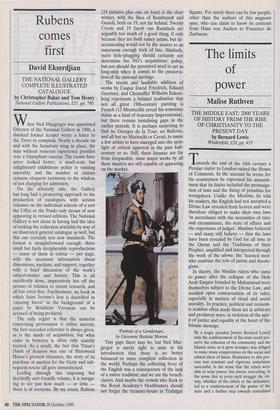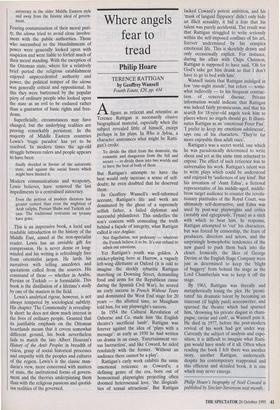The limits of power
Malise Ruthven
THE MIDDLE EAST: 2000 YEARS OF HISTORY FROM THE RISE OF CHRISTIANITY TO THE PRESENT DAY by Bernard Lewis Weidenfeld, £20, pp. 433 Twards the end of the 18th century a Persian visitor to London visited the House of Commons. In the account he wrote for his countrymen he expressed his astonish- ment that its duties included the promulga- tion of laws and the fixing of penalties for wrongdoers. Unlike the Muslims, he told his readers, the English had not accepted a Divine Law revealed from heaven and were therefore obliged to make their own laws `in accordance with the necessities of time and circumstance, the state of affairs and the experience of judges'. Muslims believed — and many still believe — that the laws have been revealed by God for all time in the Quran and the Traditions of their Prophet, amplified and interpreted through the work of the ulema, the 'learned men' who combine the role of jurists and theolo- gians.
In theory, the Muslim rulers who came to power after the collapse of the Holy Arab Empire founded by Muhammad were themselves subject to the Divine Law, and avoided open contravention of its rules, especially in matters of ritual and social morality. In practice, political and econom- ic realities often made them act in arbitrary and predatory ways, in violation of the spir- it of justice and equality at the heart of the Islamic message.
By a tragic paradox [writes Bernard Lewis] only the reinforcement of the state could pre- serve the cohesion of the community and the Islamic state, as it grew stronger, was obliged to make many compromises on the social and ethical ideas of Islam. Resistance to this pro- cess was constant and vigorous; sometimes successful, in the sense that the rebels were able to seize power, but always unavailing, in the sense that in every such struggle the vic- tory, whether of the rebels or the defenders, led to a reinforcement of the power of the state and a further step towards centralised
autocracy in the older Middle Eastern style and away from the Islamic ideal of govern- ment.
Fearing contamination of their moral puri- ty, the ulema tried to avoid close involve- ment with the public authorities. Those who succumbed to the blandishments of power were generally looked upon with suspicion and were liable to forfeit much of their moral standing. With the exception of the Ottoman state, where for a relatively brief period the religious establishment enjoyed unprecedented authority and power, the political temper of the ulema was generally critical and oppositional. In this they were buttressed by the popular piety of ordinary people who looked upon the state as an evil to be endured rather than a guarantor of basic rights and free- doms.
Superficially, circumstances may have changed, but the underlying realities are proving remarkably persistent. In the majority of Middle Eastern countries Lewis's 'tragic paradox' has yet to be resolved. In modern times the age-old struggle between rulers and people appears to have been
finally decided in favour of the autocratic state, and against the social forces which might have limited it.
Modern communications and weaponry, Lewis believes, have removed the last impediments to a centralised autocracy.
Even the pettiest of modern dictators has greater control than even the mightiest of Arab caliphs, Persian Shahs and Turkish sul- tans. The traditional restraints on tyranny have gone.
This is an impressive book, a lucid and readable introduction to the history of the Middle East, aimed at the non-specialist reader. Lewis has an enviable gift for compression. He is never dense or long- winded and his writing is refreshingly free from orientalist jargon. He lards his narratives with telling anecdotes and quotations culled from the sources. His command of these — whether in Arabic, Persian or Turkish — is formidable. This book is the distillation of a lifetime's study by one of the masters in the field.
Lewis's analytical rigour, however, is not always tempered by sociological subtlety. His chapter 'The Commonalty' is revealing- ly short: he does not show much interest in the lives of ordinary people. Granted that its justifiable emphasis on the Ottoman heartlands means that it covers somewhat different ground, his book nevertheless fails to match the late Albert Hourani's History of the Arab Peoples in breadth of vision, grasp of social historical processes and empathy with the peoples and cultures of the region. Lewis's is the classic man- darin's view, more concerned with matters of state, the institutional forms of govern- ment and the theories underpinning them than with the religious passions and quotid- ian realities of the governed.



































































 Previous page
Previous page